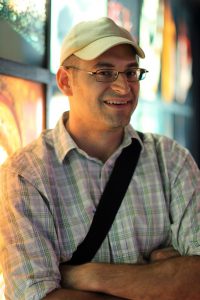Patrick Burns and Jon Stanfill named as Fordham’s 2012-13 HASTAC Scholars
The Graduate School of Arts and Sciences, in collaboration with the Digital Humanities Working Group, is pleased to announce the second year of Fordham’s GSAS-sponsored HASTAC Scholars with awards to Patrick J. Burns, a Senior Teaching Fellow in the Department of Classics, and Jon Stanfill, a doctoral candidate in the Department of Theology.
 |
| Patrick Burns (Classics) 2012-13 HASTAC Scholar |
Burns’ digital research focuses on the application of corpus-linguistics methodologies, such as tree banking, annotation, and the use of the Python Natural Language Toolkit in the study of Latin literature. Burns participated in the NEH-sponsored Summer Institute on the Perseus Project held at Tufts University last summer that explored many of these topics. He has also been at work on a digital teaching resource, the Tin Latin Reader, which he uses in the Latin courses he teaches.
 |
| Jon Stanfill (Theology) 2012-13 HASTAC Scholar |
Stanfill will be investigating both the pedagogical possibilities of experiencing the world of Byzantium in the virtual realm, and the promise of cladistic analysis, which uses evolutionary biological algorithms for the editing of medieval manuscripts. Stanfill traces his interest in cladistic analysis to a seminar taught by Center for Teaching Excellence Director and medieval studies scholar Erick Keleman.
HASTAC (an acronym for Humanities, Arts, Science, and Technology Advanced Collaboratory, pronounced “haystack”) is an international network of undergraduate and graduate students, faculty, librarians, archivists, museum curators, publishers, and IT specialists. Members of the HASTAC community blog, host forums, organize events, and discuss new ideas, projects, and technologies that reconceive teaching, learning, research, writing and structuring knowledge.
The HASTAC Scholars program fosters an innovative community of graduate students nominated and sponsored by their institutions to participate in an online community focused on digital scholarship, pedagogy, and publishing. The award comes with a modest honorarium and access to campus digital humanities mentorship, as well as the opportunity to participate in the dynamic online community that includes HASTAC Scholars from more than 75 universities from around the world.
The 2011-2012 Fordham HASTAC scholarship, which marked the university’s inaugural year participating in the program, went to Elizabeth Cornell, a pre-doctoral fellow in the Department of English, for her work on the Keywords Collaboratory, an interactive project directed by Fordham English professor Glenn Hendler and University of Washington professor Bruce Burgett.
The Digital Humanities Working Group and the Graduate School of Arts and Sciences plan to make the HASTAC Scholars program an annual award, with application deadlines in early September 2013. Stay tuned for more information.
